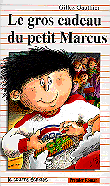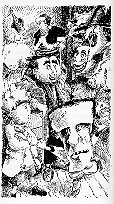


|
Le Gros Cadeau du petit Marcus.
Gilles Gauthier. Illustrated by Pierre-Andrérome.
Grades 6 - 8 / Ages 11 - 13. *** /4
|

excerpt:
Le Temps des Fêtes ... C'est le pire, tu sais ... Tout le monde s'amus e ... Tout le monde boit ... Et tu as peur que ... Marcus a voulu continuer, mais il n'a pas pu. Il avait la gorge serrée. Il a lentement baissé la tête.Si tu savais, Jenny, les Noëls qu'on a passé la maison, maman et moi ... Ce n'était jamais le père Noël qu'on attendait ... Oui, mais ton père n'a pas bu une goutte depuis deux mois.
Depuis qu'Antoine l'aide. La Puce a relevé la tête. Il a eu un petit sourire, l'espace d'une seconde. C'est vrai, mais ... il n'y a pas eu de Noël tout ce temps-là.
 As the above conversation reveals, Gilles Gauthier deals with the very serious problem of children and their alcoholic parents in this novel published by la Courte Echelle in the series "Premier roman."
As the above conversation reveals, Gilles Gauthier deals with the very serious problem of children and their alcoholic parents in this novel published by la Courte Echelle in the series "Premier roman."
Le gros cadeau du petit Marcus is Gauthier's eleventh novel published by La Courte Echelle and the fourth in the series with the central character "Marcus la Puce." Well-known for Ne touchez pas à ma Babouche and its sequels, Gauthier also won the Mr. Christie Book Prize in 1992 for Le gros problème du petit Marcus, which reveals the father's alcoholism as the source of Marcus' problems at school and concludes with the young boy's joy at seeing his father join Alcoholics Anonymous.
In Le gros cadeau Marcus' father has stayed sober since joining Alcoholics Anonymous, but Marcus is still fearful that his father may have a relapse and ruin the festive season - as he has always done in the past. Another adult problem threatening Marcus' happiness is that Antoine, the school caretaker who befriended him and helped his father cope with alcoholism, is tempted himself by alcohol when his girlfriend is deported. Fortunately, Marcus' father is there to help Antoine in his turn. Despite his intense shyness, he fills in for Antoine, who is busy with Immigration officials, by taking on the role of Father Christmas at the school. Marcus is overjoyed at this, remembering an incident when his father had been too drunk to see him perform in a school play. It is indeed a wonderful Christmas gift for Marcus.
While effectively portraying a dysfunctional family, Gauthier neatly sidesteps the potential danger of being maudlin. In part, this is due to his decision to use Marcus' friend Jenny, a concerned observer of this family drama, as the narrator. Passionately loyal to her friend, she is eminently level-headed and likeable. Characters are made even more sympathetic by the engaging illustrations by Pierre-Andrérome, especially those of Marcus in his Montréal Canadiens sweater, of the faithful Jenny with her headband and curly hair, and of Mordicus, the school guinea pig who has always been a comfort to Marcus.
The large font is very suitable for this series which acts as a transition between illustrated story books and novels. I would recommend this novel as a realistic but optimistic treatment of an all-too-common problem, although its appeal may be somewhat limited by its subject matter.
Recommended.
Kathleen Kellett-Betsos is an assistant professor in the Department of French at Ryerson Polytechnic University in Toronto.

To comment on this title or this review, send mail to cm@umanitoba.ca.
Copyright © 1997 the Manitoba Library Association. Reproduction for personal use is permitted only if this copyright notice is maintained. Any other reproduction is prohibited without permission.
Published by
The Manitoba Library Association
ISSN 1201-9364
AUTHORS |
TITLES |
MEDIA REVIEWS |
BOOKSHELF
BACK ISSUES |
SEARCH |
HOME